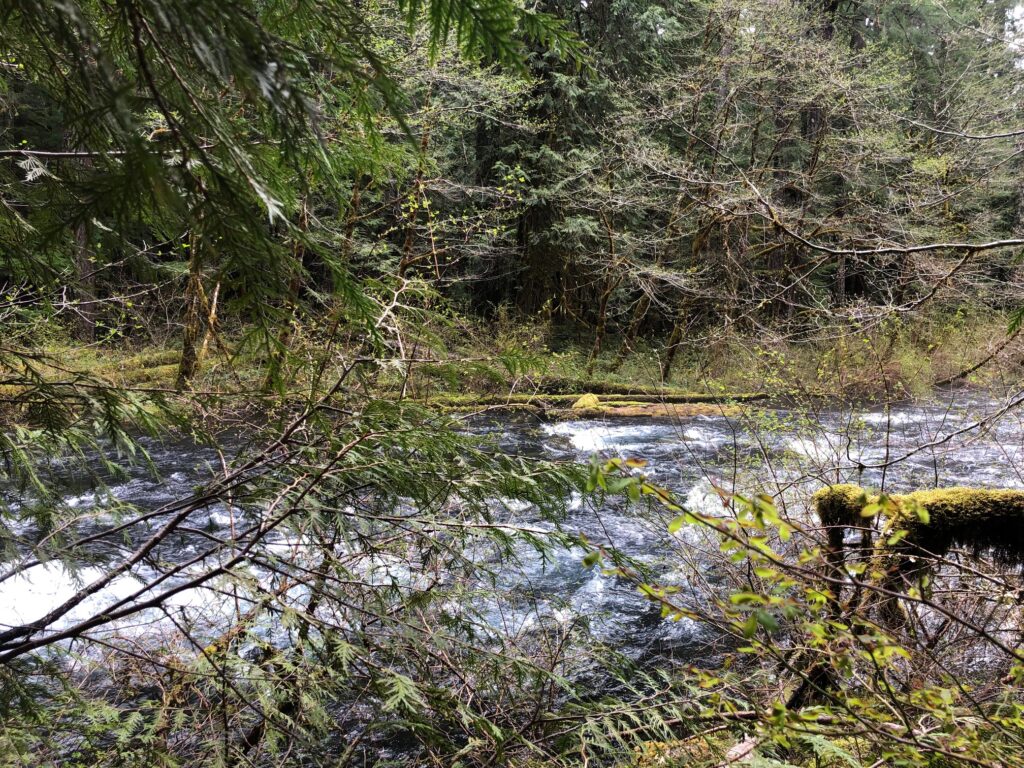Land Rush

Original Fiction
Patricia Crisafulli
Summer of ’72
Casting a spinner from shore, Vernon followed the line’s arc to where the lure lit softly on the water and rode the ripples. Raising his eyes toward the horizon, he looked across Little Rocky Lake toward the docks and roof peaks of a half dozen A-frame cottages, barely visible to the naked eye, but he knew they were there. His grandfather had owned that lakefront land, and his father had sold it off forty years ago, lot by lot, leaving only a landlocked parcel worth nothing except timber harvested every five years or so.
Vernon felt a tug and focused on the line, imagining some nice brook trout swimming in butter and dappled with parsley flakes for tonight’s dinner. The tenseness in his chest loosened. Nothing else existed—not the outside world with the Vietnam War and some idiots breaking into a building in Washington, and not his insular world of checking electrical lines for Adirondack Power. Just him and the fish.
The strike jerked the pole, and he tightened his grip to reel in a trout nearly a foot long. Casting again, he caught a 10-incher in almost the same spot. He played that rod and reel like a gambler with a hot hand until he hit his limit.
With the sun riding halfway up the sky on a late June morning, Vernon packed up his tackle to get home. As he headed for his pickup, he saw the orange and blue of a New York State truck through a gap in the trees. Road crew, he surmised. Ttruck tires crunched the gravel of the parking area.
“They bitin’?” the driver asked.
Vernon got closer. Driving a utility truck for the past twenty-some-odd years, he knew or at least recognized most of the state highway guys around here. The driver looked familiar. “Got five brook trout.”
“We’re going to be doing a little work here,” the driver added.
“On a Saturday?” Vernon turned toward the parking area with its small boat ramp.
The driver cut the engine and opened the door. “Surveying.” Two other men exited the cab on the passenger side.
Vernon took off his cap and ran his fingers through his salt-and-pepper hair. “I work for Adirondack Power. Didn’t hear of anything going on here.”
The driver stood next to Vernon while the surveyors set up their tripod and gear. “Somebody is talking to somebody in Albany about developing this spot.”
Vernon felt the pinch of losing his favorite fishing spot. “For real?”
“Hotel, marina. Some bigwig went fishing up here and liked the place,” one of the surveyors added.
Vernon fingers moved to the stubble on his chin. “I got thirty-six acres on the other side—not on the lake, but pretty near it.”
“Well, you stick a for sale sign on that property pretty damn quick,” the surveyor said. “But you didn’t hear that from me.”

Marla held a clothespin in her teeth so she could use both hands to pull one end of a bedsheet out of the wicker laundry basket at her feet. She folded a corner over the line and clipped the clothespin, then did the same in the middle of the sheet and at the far end. It caught the breeze like the sail of a ship.
Leaving the empty laundry basket under the line, she walked toward her flower garden where the climbing rose had started to open. Checking for beetles and finding only one, Marla let her gaze caress the snapdragons, petunias, and tall stalks of delphiniums with dark blue star-like blooms. Coming round to the front of the house, she deadheaded the flowers in the pots flanking the step. She heard the rumble of Vernon’s truck and turned as he pulled in a little fast, spewing gravel.
“Who’s chasing you? The devil?” she asked.
“You’re not going to believe what I just heard,” Vernon said, giving the truck door a slam.
Marla followed him into the garage where he spread newspaper over the worktable and began to clean the fish. She pulled over a lawn chair with a ripped back, the woven strip drooping like a flag on a still day.
Vernon repeated his conversation with the state crew, drawing out the details the surveyor had shared. “Hotel and marina—a whole development. If they buy up property around Little Rocky, they’ll need those thirty-six acres.”
He waited for his wife’s reaction, but she said nothing at first. Then a smile spread slowly across her face. “You hungry for lunch?” Marla got up and pushed the lawn chair to the side.
Vernon shrugged. “When I finish here, I could eat a sandwich.”
“Good, because we’re going to The Early Bird.”

Vernon glanced around the diner from the stool at the counter where Marla insisted they sit so they could hear the gossip. He nodded to Gene the repairman, who finished the last of his scrambled eggs. The Grabel sisters, Eva and Ava who dressed exactly alike even though they were a year apart and over fifty, both ate soup.
“I’ll have a steak and eggs,” Vernon said.
Dotty’s grin revealed a missing tooth in the corner of her mouth. “Haven’t had a steak order in two days. You strike it rich?”
Vernon frowned. “Steak ain’t old, is it?”
Dotty shook her head. “Nah, fresh this morning. Bill cuts up the ones we don’t sell for stew meat.”
He’d remember never to order that.
Marla asked for a tuna fish sandwich, then upgraded to a tuna melt and a small Coke. “We’re being wicked, spending money like this,” she told her husband when Dotty left.
Vernon lowered his head toward Marla’s. “When those development people come knocking, we’re not taking the first offer. They’ll lowball the locals. We’ll hold out, just a little. Play ‘em like a fish.”
Marla sat up straight, frowning. “But we’ve been wanting to get rid of it. You told me a thousand times nobody wants it ‘cause it’s not on the lake.”
“But when they buy the lakefront property, they’ll want what’s behind it, too,” Vernon said, his jaw tensing. “We’ll discuss it later.”
“Discuss what?” Dotty stood in front of them, holding Marla’s small Coke in a glass scratched by too many trips through the old dishwasher.
Marla pressed her lips together, but Vernon got an idea. “Anybody stop in here, Dotty? Out of towners, looking at property?”
Dotty hitched up one hip and planted a fist against it. “Not this morning.”
“I seen ‘em,” Gene said from down the counter. “Two cars driving around with somebody from the state. Office of Tourism—said it right on the door.”
“Vacation people come here all the time. Our grandfather built some of the first cottages around here,” Ava Grabels piped up. Eva chimed in, and the two sisters recited a history of the summer people going back to the 1920s.
Vernon looked over his shoulder at Dotty. “Don’t you have to fill their cups?” He nodded toward the sisters as they prattled on.
“Then I’d miss what you’re about to say,” Dotty replied.
Vernon got up and walked over to Gene’s stool. “You still got that property over on Meyer Road?” he asked, his voice low.
Gene nodded. “I let my brother live there. House ain’t worth much.”
“But the land could be. You get it listed,” Vernon told him.
“Somebody’s gonna buy it?” Gene’s words silenced the diner.
The Grabels got up from their table and moved closer.
“You never know,” Vernon said. “Keep our ears open.”

The next day, Marla overheard no less than five people at church talking about somebody buying up land around the town. Elmer Jonas bragged that he’d painted “for sale” on a piece of plywood and set it up by the mailbox that morning. Imagining the windfall, people spun tales of travel, moving to Florida, buying a Cadillac.
“Not one penny to the building fund?” Marla asked loudly, turning heads. “Vernon and I pledge ten percent.” She ignored her husband’s pleading look. “Maybe even twenty.” The realization of what she’d just said hit her like a cold draft on the back of her neck. She rubbed at the spot, wondering if maybe they wouldn’t have to give it away all at once.
Rev. Alen Barklin ran his hand across the thin waves of hair that did nothing to cover his pink scalp. “Money changes people. Remember what Jesus said, ‘No man can serve two masters.’”
“We said we would pledge, pastor,” Marla said, her words enunciated with a new emphasis that she supposed came from having money.

Making the rounds in his utility truck on Monday, Vernon stopped at the mini mart to use the bathroom and get a black coffee. He overheard a couple talking to someone about selling a stand of timber and using the money to fix up the house and put in a pool—in-ground, not one of those standup things like a giant water dish. A few hours later, after pulling to the side of the road to eat the lunch Marla had packed, he splurged on a piece of pie at the diner. Eva and Ava Grabel shared a slice of lemon pound cake and talked about selling the land behind the family home and visiting Rome and the Holy Land, as if those two places were right next door to each other—like Vermont and New Hampshire.
Gene the handyman came in as Vernon was leaving. “You go by your fishing spot today?”
“No. Been working out by Miller’s Crossing.”
“You need to see it. Surveyor stakes all over place—and I mean all over the place. Both sides of Little Rocky.”
Vernon clamped a hand to the man’s shoulder in thanks and headed out the door.

Marla set the dining room for supper, instead of eating in the kitchen. Catching her reflection in the mirrored back of the old curio cabinet that had belonged to Vernon’s mother, Marla checked her bright pink lipstick that matched the nicest housedress she’d sewed for herself over the winter.
When Vernon came in, hungry and grimy, Marla refused to lift one pot from the stove until he went upstairs to shower and change. He stomped away, muttering something about certain people getting uppity, but Marla didn’t care. If raising herself and her place in the world meant putting on airs, then so be it.
Arranging parsley sprigs around the serving platter, just like they did in restaurants, Marla let her thoughts drift back to her childhood: living in the back country, missing weeks of school because nobody plowed dirt roads out that far, her father working seasonally as a woodcutter, her mother cleaning houses for vacation people. She’d met Vernon at sixteen and had to get married at seventeen, two days after his high school graduation. She never graduated.
Vernon worked hard and she knew how to cook; that’s what saved them. When their kids were little, she had babysat for summer people. Later, she’d taken a job at the IGA in the next town, eight hours a day on her feet at the cash register, but the paycheck had helped.
She caught a whiff of Irish Spring soap and turned to smile at Vernon, as handsome as he’d been at the high school dance a lifetime ago. He opened his arms and she stepped into his embrace.

For two weeks, Vernon drove past the Little Rocky boat ramp at least once a day to see if anything had changed. When a rainstorm toppled a few of the surveyor stakes, he got out of the truck and propped them back up. He left, mud-splashed and wet to the shins by the tall grass, and headed to an overload out on County Route 2B.
He scrambled up the pole, clipped the safety on his belt. Adjusting his leather gloves with the reinforced palms, Vernon told himself that, as soon as the land sold, he’d put in for early retirement.
A jolt shot through him like a blast from a rifle. The sky pinwheeled and everything went dark.

Wadding a handful of soggy tissues into a tight ball, Marla made a bargain. Take away the land deal, just leave them as they’d been—working for a living and getting by, the kids and grandkids healthy, the two of them with years ahead. They didn’t need to travel or buy new clothes. They didn’t need steak and eggs or a second car.
Gene sat beside her in the waiting room of the hospital trauma center, an hour away. He’d come upon the scene as the paramedics and volunteer firemen took Vernon off the pole. He’d been the one to tell her what had happened.
A nurse walked past, and Marla looked up, hopeful for any update on Vernon’s surgery on his left hand, so badly burned when the electricity exited his body. No way to save it, the doctors had said. Still, she hoped.
When Pastor Barklin showed up, Gene said he had to be getting on home. Marla hugged him, feeling his beefy hand pat between her shoulder blades. “He’s a tough ‘un,” Gene said, and Marla saw him wipe his eyes.

Summer of Seventy-Three.
Vernon drove himself one-handed, pulling into Gene’s driveway at the appointed time. The other man invited him in, but Vernon suggested they sit outside for the sunshine and privacy. Taking a deep breath, Vernon repeated what he’d said on the phone the day before: he wanted to tell Gene what happened. He hadn’t told anyone else.
“I got zapped and it all went black. Then I could see everything. I saw the car that stopped, then sped off—knowing that they were heading home to call the fire department. I saw the paramedics get in the ambulance. I watched the volunteer firemen answer the call.” Vernon studied an ant crawling along the picnic table where they sat. “And I saw you coming up Meyer Road, making the turn onto Route 2B. You had the radio on—Glen Campbell was singing Galveston.”
“I love that song,” Gene said.
Closing his eyes, Vernon described the scene that came to him in Technicolor, from high above—light as a bird with no pain and one thought in his mind. Marla. How a rush like the wind had filled his ears and he slammed back into his body, wide awake and in excruciating pain.
“I knew before they told me that I’d lose my hand. I remember saying ‘okay,’ in my head, as if that was my sacrifice for being able to stay. I didn’t care. As long as I was alive.”
Gene looked down at his hands, turning them palms up. “I’d do the same—even give up an arm or a leg.”
The following Sunday afternoon, Vernon sat on the shores of Little Rocky Lake, as undisturbed as ever—no development, the surveyor’s stakes long gone.
He practiced a one-handed cast and hit the water just about where he intended. He held the fishing rod against his body with the prosthesis and used his right hand to feed out the line. Marla stood beside him, ready to help.
A fish took the spinner, and Vernon set the hook, then handed the rod to Marla to reel in. Next time, she’d have her own gear, he decided, and they’d fish together.
A 14-inch brook trout came up fighting, the biggest of the three they’d caught so far. Marla expertly took out the hook and set the fish in the basket lined with damp leaves.
“What do you say, cast one more time?” Vernon asked. “I’m feeling lucky today.”
Marla grinned back at him.
Yes, he thought, lucky indeed.



